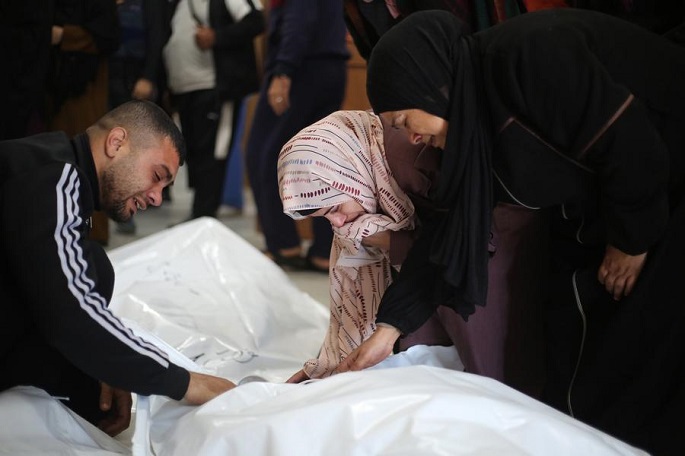Heavy Israeli strikes deprive wounded of farewell to slain relatives
Published : 31 Dec 2023, 00:46
Updated : 31 Dec 2023, 00:50
An Israeli attack on the southern Gaza Strip had taken away Samira Ismael's entire family, leaving her with deep shrapnel wounds and bruises all over her body, reported Xinhua.
She became stable two days after being rushed to a government hospital in Khan Younis. But the severe injuries made it risky for the 28-year-old Palestinian to attend the brief funeral for her mother, father and siblings, not too far away in a municipal cemetery.
Losing the last chance to bid farewell to her loved ones, the woman was plunged into unbearable agony.
"Everything was done quickly ... This war left me all alone with a lot of bad memories," the grieving woman told Xinhua.
"I cannot deal with the pain that I have now. I miss my family and want to kiss all of them," she said with teary eyes.
Younis Abu Al-Ezz, a Palestinian man who had evacuated most of his family members to the central city of Deir al-Balah, failed to stay by her father's deathbed.
Amid the chaos brought by interrupted communications and severely damaged infrastructure, Abu Al-Ezz received the bad news two days after his father's demise.
The old man had refused to relocate southward as repeatedly ordered by the Israeli army, only willing to move to the Al-Shifa Hospital in Gaza City, where, in heavy Israeli attacks, he was left with fatal gunshot wounds.
"My father's killing was like a strong slap in my life, mainly as I am his older son, but I was not present with him in these nervous moments," Abu Al-Ezz told Xinhua.
Since Oct. 7, the bloody Israel-Hamas conflict has been raging on in the besieged Palestinian enclave for nearly three months, leaving piles of dead bodies in tents and courtyards of hospitals across Gaza.
The burials come short and hasty. The deceased, if identifiable, would be marked with personal information on his or her shroud for relatives and friends to claim. After a prayer, they would be buried in hospital yards, sometimes in a mass grave.
"It is of great challenge to bury the dead as Israeli attacks continue," Raed Al-Nems, the spokesman for the Palestinian Red Crescent Society, told Xinhua.
Unfortunately, "mostly, people cannot bury their killed families for many reasons, including their injuries sustained from the Israeli bombing or their inability to move in light of the field and security conditions," he said.
The spokesman added that the Red Crescent crews deployed in the strip are trying to reach the victims and the wounded as soon as possible, but the situation "exceeds their capabilities with the deterioration of the health system and the scarcity of fuel needed to operate ambulances."
According to Al-Nems, the bombing resulted in large numbers of deaths and injuries in the overcrowded territory, especially in central and southern Gaza.
Gaza has been under massive Israeli siege and bombardment since Oct. 7, which so far killed 21,672 Palestinians, according to the statistics updated by the Gaza-based Health Ministry on Saturday.


